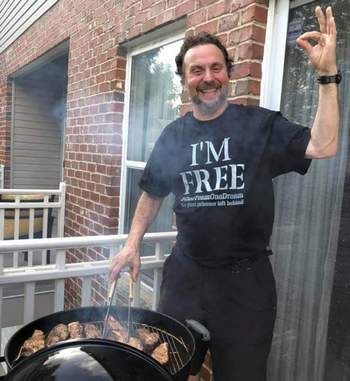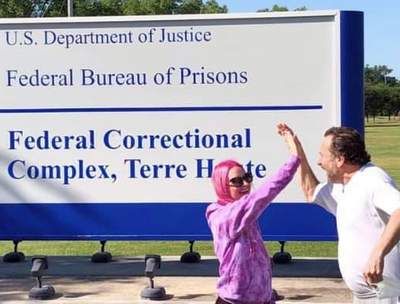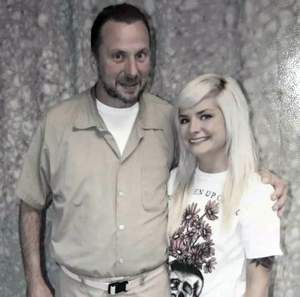
Publisher:
Bonnie King
CONTACT:
Newsroom@Salem-news.com
Advertising:
Adsales@Salem-news.com

~Truth~
~Justice~
~Peace~
TJP
Jul-15-2020 16:20

 TweetFollow @OregonNews
TweetFollow @OregonNews
Dad's Finally Home for Dinner! Craig Cesal Finds Freedom.
Mindi Hall, Salem-News.com Cannabis De-ClassifiedEXCLUSIVE INTERVIEW with Craig Cesal, recently released from federal prison where he was serving a life sentence on a first offense drug charge.
 Craig was home for his first Father's Day BBQ in 18 years. Photos provided with permission from Lauren Cesal. |
(PORTLAND, Ore.) - People worldwide have been feeling locked in and disconnected from family and friends. The conversation about freedom, liberty, and how to express American values is a topic of focus in the media and all over social networks.
Between the frustration and confusion are stories of hope, that I, for one, cling to during these uncertain times. One of these stories is that of Craig Cesal, federal inmate #52948-019.
For a handful of inmates, the threat of COVID-19 resulted in a lifeline. As the reported number of COVID-19 cases soar in the federal prison system, Craig Cesal is an example of how a lucky few have been reunited with family and partial-freedom, quite the opposite of how many Americans are experiencing this pandemic.
In the best of circumstances, close quarters confinement in prison is especially dangerous for those with chronic health conditions. As a diabetic, COVID-19 was a possible death sentence for Craig.
Advocates from all over the country sounded the alarm, which Craig indicates, allowed release to home confinement to become a reality.
A few weeks have passed since Craig walked out of the prison yard and into the outside world. I caught up with Craig to find out how he was doing. The following is his story in his own words.
MH: For those who have not heard your story, how much time have you served and what are the circumstances that led to your incarceration?
- CRAIG CESAL: I was arrested on March 23, 2002, and was released to home confinement on June 16, 2020. My sentence was reduced to thirty years, and I am scheduled for release from supervised release in 2028.
I owned and operated a heavy truck body shop which specialized in the repair of refrigerated semi trailers and trucks. As these often come from Mexico and points further south loaded with food and produce products, they are often used to smuggle drugs.
Insulation in the walls of semi trailers is removed, drugs are inserted and imported into the U.S. The trailer walls were torn apart to extricate the drugs, and a customer in Florida sent his trailers to my Chicago area business to be rebuilt.
When a driver was arrested, he listed me as assisting his business and marijuana venture, and I was arrested for conspiring to distribute marijuana.
I was charged in Gainesville, GA, because other federal districts did not consider this activity to violate the law; Georgia did.
Although I was 42-years old and had no prior convictions, I was nonetheless sentenced to life imprisonment without the possibility of parole, because I was unable to implicate anyone else to get a sentence reduction.
The truck driver and the company owner did not go to prison as part of the deal.
 MH: What exactly does home confinement look like for a federal prisoner?
MH: What exactly does home confinement look like for a federal prisoner?
- CRAIG CESAL: A prisoner usually serves the last six months of their sentence in a halfway house as they transition to reenter society.
The last two to three months is often served on home confinement, whereby a prisoner must stay at home, except to go to work, or to go on special "passes" to the store or otherwise as approved by the halfway house which monitors them using a GPS ankle bracelet.
On March 27, 2020, President Trump signed the CARES ACT, which allowed the attorney general to send non-violent, not likely to commit more crime inmates, who are especially vulnerable to COVID to an unlimited time on home confinement.
I am over 60-years old, diabetic, with lung problems following many years of smoking. As part of the criteria for release to home confinement, is not only being more vulnerable to the effects of COVID, but also a determination that the prisoner is not likely to commit another crime if released, and is no threat to society at large.
The rules for federal home confinement are set by federal statute, plus whatever rules the agency, in my case the halfway house, deems necessary.
I must stay at home, except when I am granted a pass to go to work, a job interview, grocery shopping, church, and other necessary things, but not visiting.
Today, I got a pass to go to the DMV and get a state I.D. card.
Basically, I must stay at home unless I get permission to go somewhere else. Most are monitored on an ankle monitor, although as a COVID release, I am not yet. I will seek employment, as the progression of COVID allows me. Then, I will go to work, return home, and be able to support myself.
MH: Is there a possibility that regardless of your ability to follow rules you might go back to prison? If so, how do you live with that?
- CRAIG CESAL: Because I am still serving my sentence until 2028, and because this is only a transfer by the Bureau of Prisons, the BOP at any time can transfer me again, possibly to a prison facility.
My hope is to show them I am doing well on home confinement, so that they would be more compelled to let me stay home.
Last weekend, former Trump lawyer Michael Cohen, also released to home confinement, was caught out at dinner in a restaurant with another couple.
Michael Cohen was in the same COVID home confinement as I. He was taken back into custody for a return to the BOP prison.
I will not do such boneheaded things, and further, I hope his stupidity doesn't put others, like me, at risk of being sent back, as the BOP can do at any time.
These types of violations may bring a drive to reincarcerate those of us on home confinement. An offender in Chicago on home confinement from state prison murdered a child this weekend. This is not good.
MH: What is the best part of your unusual release circumstances?
- CRAIG CESAL: Shortly before my release to home confinement, my daughter became engaged to marry her long-time boyfriend. I can now walk her down the aisle and be there to celebrate with her.
I live, for now, with my daughter, and was released shortly before Father's Day. I had a steak dinner on the grill.
 MH: What is your greatest challenge at this moment?
MH: What is your greatest challenge at this moment?
- CRAIG CESAL: Having been imprisoned for over eighteen years, I have not used smartphones, laptops, Facebook, or any of what folks take for granted now.
I feel as though I have traveled in a time machine, and am learning to master this new technology, between the laughs of my daughter. Last week I went to the grocery store on my first pass, and EVERYTHING has changed.
I left prison with not even a change of socks, and all of my belongings are long gone. I spend hours a day scouting to find employment opportunities, which is very limited for my age, position, and in this era of COVID.
MH: What support, if any, has the "system" afforded to you?
- CRAIG CESAL: The prison system, and the U.S. Probation Office, which is supposed to assist me in getting employment and medical care, has not only not helped, but has worked to hinder my reentry.
The U.S.P.O. says they will block me from any employment which would cause me to live "too comfortably" or jobs that have too much responsibility. Not what I or any taxpayer should expect.
I have only begun my job search, and I believe I will have to seek out friends for assistance, especially in light of the restrictions imposed by the U.S.P.O.
My age and technological challenges also limit what jobs I can qualify for. The near 20% unemployment in this age of COVID also presents an obstacle. For now, I am the handyman at my daughter's home.
MH: Have you allowed yourself to dream about your post conviction life possibilities?
- CRAIG CESAL: I not only dream of a life after prison, but every day I plan and work for it. Gainful employment, advocacy work as much as I can do from home, and other plans are what I see on the horizon.
I am also trying to attach to the political arena in this election season as an example of what criminal justice reform can look like, by telling my own story, and showing my own success.
MH: What do you hope readers will learn from your incarceration story?
- CRAIG CESAL: Our federal criminal justice system needs not just reform, but a major bottom up rebuilding. About half of federal prisoners are incarcerated for drug offenses, and serve sentences at least three times as long as those serving sentences for violent crimes such as murder.
I have watched many violent offenders come and go at the prison, even one who killed two Federal Marshals, and one who shot three CIA agents while he was working for the Taliban.
Too many families and too many neighborhoods are victims of the war on drugs, which has been lost and is futile. It needs to end, especially as it relates to marijuana sentences for what is encouraged and taxed by 33 state governments.
People like me who are non violent and an unlikely threat to society are still languishing in prison.
There are unknown numbers of non-violent prisoners facing this pandemic truly alone. The federal system is on lockdown. Communication with family is limited at best.
Organizations such as Can-Do Clemency have been working around the clock to aid non-violent drug offenders, including many cannabis prisoners, in being released from excessive sentences.
The COVID-19 pandemic has only increased the resolve of prison reform organizations to save the lives of people who deserve a second chance. To learn more about some of these cases visit: www.candoclemency.com.
Mindi Hall, Writer is Co-founder at Voices Of The Cannabis War, Volunteer at Freedom Grow and Volunteer at CAN-DO Foundation - Justice Through Clemency. She has been a KBOO Community Radio Volunteer and Cchi2016 RADIO, Voices Of The Cannabis War Show. You can reach Mindi Hall at thetigerfairytrap@gmail.com.
Articles for July 15, 2020 | Articles for July 16, 2020



Quick Links
DINING
Willamette UniversityGoudy Commons Cafe
Dine on the Queen
Willamette Queen Sternwheeler
MUST SEE SALEM
Oregon Capitol ToursCapitol History Gateway
Willamette River Ride
Willamette Queen Sternwheeler
Historic Home Tours:
Deepwood Museum
The Bush House
Gaiety Hollow Garden
AUCTIONS - APPRAISALS
Auction Masters & AppraisalsCONSTRUCTION SERVICES
Roofing and ContractingSheridan, Ore.
ONLINE SHOPPING
Special Occasion DressesAdvertise with Salem-News
Contact:AdSales@Salem-News.com

googlec507860f6901db00.html
Terms of Service | Privacy Policy
All comments and messages are approved by people and self promotional links or unacceptable comments are denied.
[Return to Top]
©2026 Salem-News.com. All opinions expressed in this article are those of the author and do not necessarily reflect those of Salem-News.com.